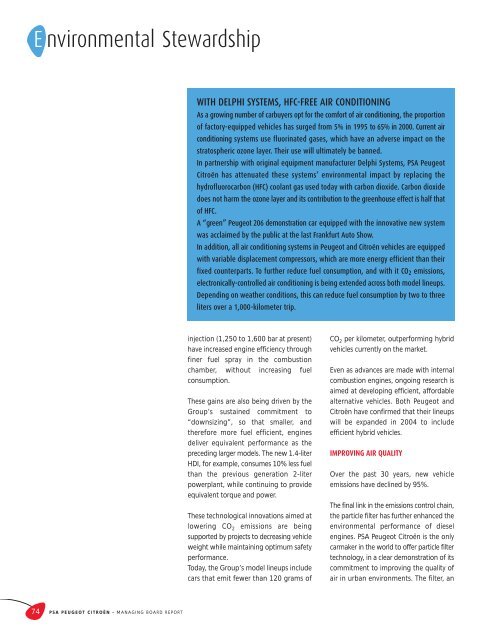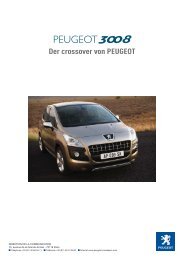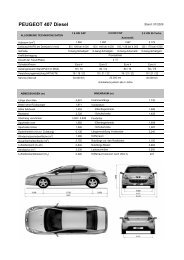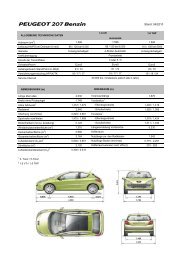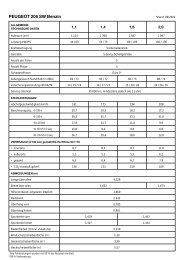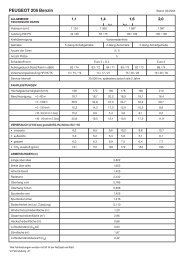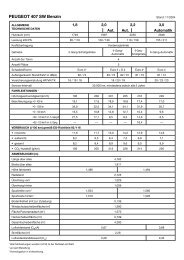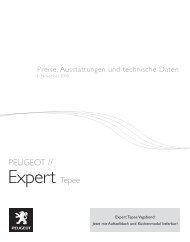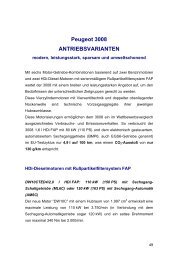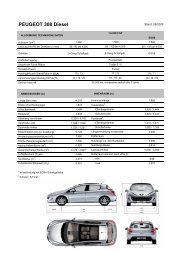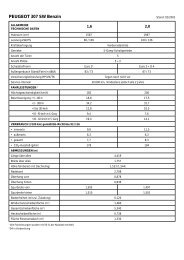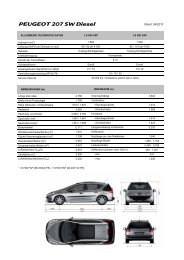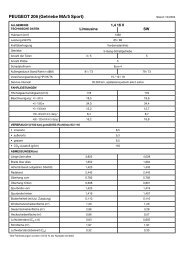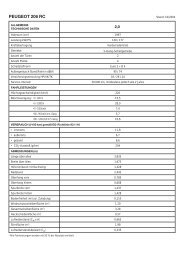PSA COUV page . page RA GB - PEUGEOT Presse
PSA COUV page . page RA GB - PEUGEOT Presse
PSA COUV page . page RA GB - PEUGEOT Presse
You also want an ePaper? Increase the reach of your titles
YUMPU automatically turns print PDFs into web optimized ePapers that Google loves.
E nvironmental Stewardship<br />
WITH DELPHI SYSTEMS, HFC-FREE AIR CONDITIONING<br />
As a growing number of carbuyers opt for the comfort of air conditioning, the proportion<br />
of factory-equipped vehicles has surged from 5% in 1995 to 65% in 2000. Current air<br />
conditioning systems use fluorinated gases, which have an adverse impact on the<br />
stratospheric ozone layer. Their use will ultimately be banned.<br />
In partnership with original equipment manufacturer Delphi Systems, <strong>PSA</strong> Peugeot<br />
Citroën has attenuated these systems’ environmental impact by replacing the<br />
hydrofluorocarbon (HFC) coolant gas used today with carbon dioxide. Carbon dioxide<br />
does not harm the ozone layer and its contribution to the greenhouse effect is half that<br />
of HFC.<br />
A “green” Peugeot 206 demonstration car equipped with the innovative new system<br />
was acclaimed by the public at the last Frankfurt Auto Show.<br />
In addition, all air conditioning systems in Peugeot and Citroën vehicles are equipped<br />
with variable displacement compressors, which are more energy efficient than their<br />
fixed counterparts. To further reduce fuel consumption, and with it CO 2 emissions,<br />
electronically-controlled air conditioning is being extended across both model lineups.<br />
Depending on weather conditions, this can reduce fuel consumption by two to three<br />
liters over a 1,000-kilometer trip.<br />
injection (1,250 to 1,600 bar at present)<br />
have increased engine efficiency through<br />
finer fuel spray in the combustion<br />
chamber, without increasing fuel<br />
consumption.<br />
These gains are also being driven by the<br />
Group’s sustained commitment to<br />
“downsizing”, so that smaller, and<br />
therefore more fuel efficient, engines<br />
deliver equivalent performance as the<br />
preceding larger models. The new 1.4-liter<br />
HDI, for example, consumes 10% less fuel<br />
than the previous generation 2-liter<br />
powerplant, while continuing to provide<br />
equivalent torque and power.<br />
These technological innovations aimed at<br />
lowering CO 2 emissions are being<br />
supported by projects to decreasing vehicle<br />
weight while maintaining optimum safety<br />
performance.<br />
Today, the Group’s model lineups include<br />
cars that emit fewer than 120 grams of<br />
CO 2 per kilometer, outperforming hybrid<br />
vehicles currently on the market.<br />
Even as advances are made with internal<br />
combustion engines, ongoing research is<br />
aimed at developing efficient, affordable<br />
alternative vehicles. Both Peugeot and<br />
Citroën have confirmed that their lineups<br />
will be expanded in 2004 to include<br />
efficient hybrid vehicles.<br />
IMPROVING AIR QUALITY<br />
Over the past 30 years, new vehicle<br />
emissions have declined by 95%.<br />
The final link in the emissions control chain,<br />
the particle filter has further enhanced the<br />
environmental performance of diesel<br />
engines. <strong>PSA</strong> Peugeot Citroën is the only<br />
carmaker in the world to offer particle filter<br />
technology, in a clear demonstration of its<br />
commitment to improving the quality of<br />
air in urban environments. The filter, an<br />
74<br />
<strong>PSA</strong> <strong>PEUGEOT</strong> CITROËN - MANAGING BOARD REPORT


